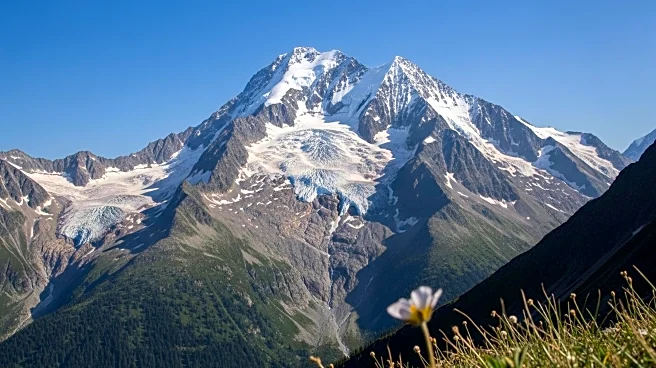What's Happening?
Recent research published in the journal Science indicates that limiting global warming to 1.5°C above pre-industrial levels could preserve half of the world's mountain glaciers. Current trends, however, suggest a warming trajectory of about 2.7°C, which could result in the loss of three-quarters of these glaciers. Switzerland's glaciers have been notably affected, losing a quarter of their ice over the past decade. In 2024 alone, glaciers outside Greenland and Antarctica lost 450 billion tonnes of ice, equivalent to a massive block of ice 7 kilometers in each dimension. This melting is attributed to the hostile climate created by global warming, as explained by experts like Prof Ben Marzeion from the University of Bremen.
Why It's Important?
The melting of glaciers has significant implications for global sea levels and freshwater availability. As glaciers act like reservoirs, their loss could destabilize river flows, impacting agriculture, hydropower, and drinking water supplies, especially in mountain communities. The situation is particularly critical in Asia's high mountains, where approximately 800 million people depend on glacier meltwater. The continued loss of glaciers could exacerbate water scarcity, affecting food security and economic stability in these regions. The research underscores the urgency of reducing carbon emissions to mitigate these impacts and preserve vital water resources.
What's Next?
If global temperatures continue to rise, the retreat of glaciers will persist, leading to further environmental and socio-economic challenges. However, the research suggests that immediate action to limit warming could still preserve a significant portion of glacier ice. This calls for global efforts to decarbonize and reduce carbon footprints, which could help stabilize the climate and protect these critical natural resources. The findings empower policymakers and the public to take decisive action to combat climate change and its effects on glaciers.
Beyond the Headlines
The rapid melting of glaciers also raises ethical and cultural concerns, as these natural formations hold historical and spiritual significance for many communities. The loss of glaciers could lead to cultural dislocation and the erosion of traditional practices linked to these landscapes. Additionally, the scientific community faces the challenge of communicating the urgency of climate action while navigating the complexities of public policy and international cooperation.









